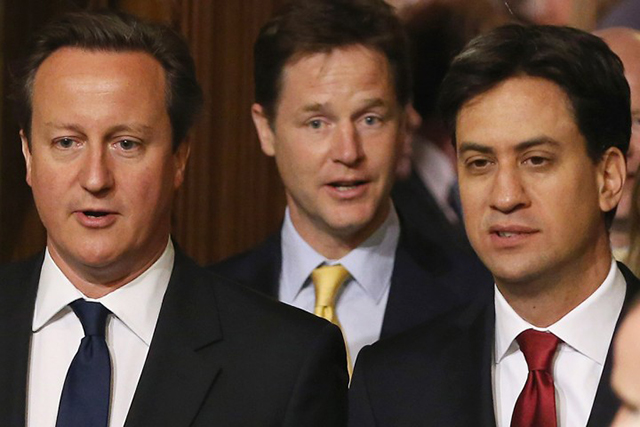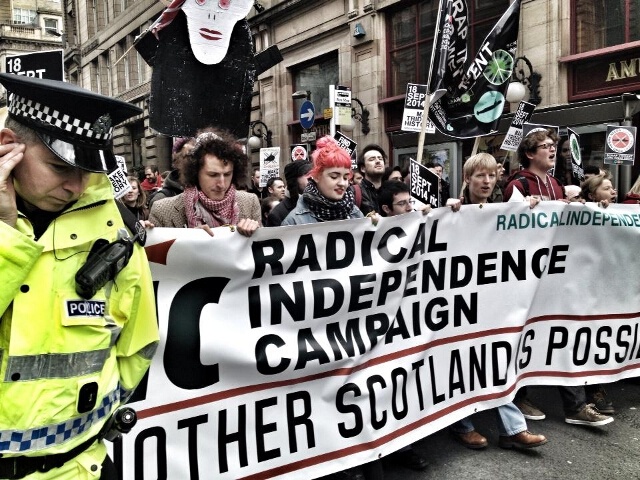by Alan Thornett
September 24, 2014
The proposal for an independent Scotland has been defeated in the referendum and the ruling elites have expressed a huge collective sigh of relief. It was a defeat based on fear and intimidation organised by the No campaign in collusion with Downing Street which delivered a “no” vote by a margin of 44.7% to 55.3%.
The whole of the Westminster establishment and the three ‘main’ political parties were lined up against a Yes vote. To these we can add virtually the whole of the media, the banks, the supermarkets, and the City of London. The military establishment entered the debate around in defence of Trident. They have managed to prevail by exploiting fear, intimidation and appeals to every kind of reaction and conservatism over the most remarkable grassroots campaign ever seen in these islands. Internationally they enlisted support from Barack Obama to the President of the EU.

“Team Westminster.” From left to right: David Cameron, Nick Clegg, Ed Miliband.
Labour politicians, led by a re-emerged Gordon Brown, were even more forceful than Tories in pushing this intimidation towards the voters.
Until a week or so ago, when support rose dramatically for the Yes campaign, and blind panic set in, the Westminster elites had expected a walkover. They didn’t even bother with contingencies. When Hammond was asked why there was no contingency to move Trident he said it was because the Government considered the possibility of a Yes vote as a ‘very low probability’. It was a statement that not only reflected the divide between Westminster and Scotland but the contempt with which the Tory leadership regarded that divide.
The Yes campaign should be congratulated and celebrated, despite the result. It generated a huge national debate that rose to ever-higher political levels as the referendum date approached. This is expressed in the remarkable statistics with registration at 97% and the turnout at 84.6%. This is a clear sign that when real change is on offer people will engage with it and grasp the opportunity to shape their own destiny.
The Yes campaign was not based on crude nationalism or anti-English sentiment, but on the idea of a different kind of Scotland with new level of political democracy and involvement. It was based on the idea that people living in Scotland should rule Scotland and that the long period of English dependency should come to an end. It was based on the idea that they should not have Tory governments imposed on them that they did not vote for, and which had virtually no support in Scotland.
It reflected resentment in Scotland that a range of Tory policies from student fees, benefit cuts, especially for the sick and disabled, the bedroom tax, tax cuts for the rich, and foreign wars were imposed on them by people with no support in Scotland.
The strength of the Yes campaign is also expressed in the enthusiasm with which 16 and 17 year olds took to the campaign and the debate having been given the right to vote for the first time in the referendum. It was expressed in the remarkable energy that gripped the Yes camp in the final weeks of the campaign.
On the morning of the result Labour politicians, even more than Tories, were talking about this vote settling the issue of independence for a very long time and even for good. The critical mass of support for independence, however, has increased dramatically in the course of this campaign and that is unlikely to change. People in Scotland have spent months debating and defending the idea of independence and are more committed to it than they have ever been.
It is not surprising that it is Labour politicians are so vehement this morning. Labour has been heavily damaged by running a shoulder-to-shoulder campaign with the Tories. The biggest Yes votes were in the strongest Labour industrial (or de-industrialised) heartlands of Glasgow, North Lanarkshire, West Dumbarton, and Dundee.
The Scottish Labour Party has suffered a serious fragmentation and is likely to be in trouble particularly when it comes to the next Holyrood election in 2016 when the SNP will be seeking another majority and to replace Labour as the main left of centre social democratic party in Scotland. Those tens of thousands of Labour voters who supported the Yes campaign and were attacked by Labour for doing so may well then stick with the SNP. Particularly since a big vote for the SNP in that election would be the best way to reignite the issue of independence.
Nor should it be assumed that the Westminster elite will now deliver the extra powers to Holyrood just because they have signed a pledge on fake parchment that they will do so. This is already being cast into doubt by Tory back benchers who intend to oppose it and coalition ministers who don’t want it.
Cameron knows that to do so will strengthen the call for independence in Wales. Leanne Wood, as the leader of Plaid Cymru, has played a good role in supporting the Yes campaign in Scotland, is already making it clear that she is not prepared to see Wales left behind as Scotland discusses more powers.
It also raises the issue of the huge demographic deficit in Britain as a whole as one of the most centralised countries in Europe. It raises issues from the alienation of the Northern Cities and the Northern regions from Westminster and the South East and it raises once again the issue of First-Past-the-Post electoral system which means that most votes don’t count when it comes to an election.
It is clear from the first statements Cameron has made on this that he is more interested in looking over his shoulder to UKIP, to English nationalism, and his right-wing back benchers that fulfilling a pledge with Scotland. He is far more interested in simply stopping Scottish MPs voting on English issues, which would be popular with Nigel Farage, than looking to any kind of new constitutional settlement for England.
This poses a problem for Labour because the pledge was made first and foremost, not by Cameron, but by Gordon Brown. Cameron’s main aim now is to turn clock back on this whole development, but it won’t be easy. The Yes campaign comprehensively won the political debate. Many of the 1.6 million who voted for independence may well remain politically engages and will not take kindly to backsliding on promises or new attacks from Westminster.

The radicalisation of the Yes campaign could well translate into a new radicalism in Scottish politics. This could also have its reflection throughout Britain. Demands for more devolution and democratic reform are inevitable. Westminster has not represented Northern English cities and Northern Regions any more than it has represented Scotland.
Despite the defeat things can never go back to where they were. Business as usual is not an option.
Alan Thornett is a member of the Bureau of the Fourth International and a long-time leading member of the British Section of the Fourth International, Socialist Resistance. His most recent book, Militant Years: Car Workers’ Struggles in Britain in the 60s and 70s, was published in 2010.
